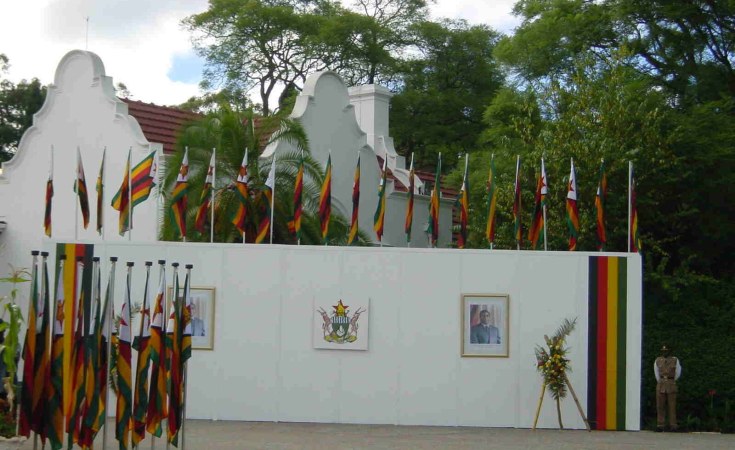Mutare — A draft provision proposing vice-presidents be elected in joint tickets with presidents has proven controversial.
President Robert Mugabe's ZANU-PF party has demanded a raft of amendments to Zimbabwe's new draft constitution, including removing the provision under which vice-presidents will be elected by voters. Previously, vice-presidents have been appointed by the president from within the party in government, but the constitutional draft - created by representatives from ZANU-PF and their Movement for Democratic Change -Tsvangirai (MDC-T) coalition partners - requires presidential candidates to name running mates in advance.
There are concerns within ZANU-PF that this would force Mugabe to reveal his desired successor ahead of elections.
Chapter 5
Chapter 5 of the draft constitution states that presidential candidates must nominate two running mates who automatically become vice-presidents if the candidate wins. If a president dies, resigns or is removed from office, the first vice-president will take office within 48 hours and remain there until the expiry of his/her predecessor's term, while the second vice-president will become the first vice-president.
After marathon discussions this month, the ZANU-PF politburo rejected several aspects of the draft including the running mate provision. Other contentious issues included clauses concerning devolution, dual citizenship and the constitutional court.
After a meeting on August 15 with President Jacob Zuma of South Africa, facilitator of Zimbabwe's Global Political Agreement, Mugabe said that ZANU-PF had considered the draft and effected amendments. Jonathan Moyo, an influential ZANU- PF MP, condemned the document, saying, "The draft constitution is not deserving of an independent country. It is a serious attack on our sovereignty". He went on to describe the draft as "a body without a brain and without a heart".
However, members of the MDC have criticised this position, claiming opposition to the draft is the result of in-fighting within ZANU-PF. "We are totally against any further negotiations because it is time-wasting and unproductive", said MDC-T spokesman Douglas Mwonzora. "Besides, this document is a product of the outreach and negotiation processes. The document must be taken to the Second All Stakeholders Conference where ZANU-PF is included, to interrogate the document [and] they can also wait for the referendum to air out their views."
He continued: "Asking COPAC [Constitution Select Committee] or the management committee or the principals to re-negotiate is tantamount to asking COPAC, management committee or the principals to decide on the factional feud within ZANU-PF."
Smooth succession?
The running mate clause has fuelled particular anxiety since it forces parties to deal with succession issues. Over the years, the MDC and ZANU-PF have largely left this to fate, which has created factionalism within parties as senior members position themselves to succeed Mugabe or Tsvangirai. There are already fears that picking running mates, who would also be next-in-line to their presidents, would further split parties along factional lines.
If the provision were to survive, most believe that President Robert Mugabe would choose current Vice-President Joice Mujuru as his first running mate, ahead of the Defence Minister Emmerson Mnangagwa, whose presidential ambitions are an open secret. But Mugabe would still need to balance other factions within ZANU-PF including former ZAPU members. The former ruling party ZANU-PF is divided into five factions, led by Mugabe, Mnangagwa, Mujuru, the military side and a group of young politicians calling themselves Generation 40, amongst whom Jonathan Moyo reportedly plays an important role.
According to MDC Secretary-General Tendai Biti, Tsvangirai has already chosen Thokozani Khupe as his running mate, but many names have been suggested for the Tsvangirai's potential second running mate including Biti himself, national chairman Lovemore Moyo, and Ian Makone, a senior secretary who is also believed to be the MDC's chief financier and a close friend of Tsvangirai.
Political implications
Law expert Alex Magaisa believes that the new system would have at least two important political implications for Zimabawe. First, even though the dual vice-presidency system may be regarded as a regional and ethnic balancing instrument, the fact that there is a clear hierarchy between the two vice-presidents bluntly suggests that whoever occupies the second spot is inferior.
"The dual system works for the politics of ethnic and regional balancing if the two are equal in status. This political solution to a political problem might therefore backfire if one region or ethnic group is always confined to the second vice president spot," says Magaisa.
Secondly, the system would push political parties to set clear their lines of succession.
"A perennial, almost nauseating issue is the succession politics in political parties which is played and replayed many times in various tunes by the media. With a system that requires the Presidential candidate to nominate his first and second running mates, with the possibility that the first running mate will become the first vice president and the first in line to succeed the president, the nomination of the first running mate will be an important signal on who the preferred successors are," notes Magaisa.
Andrew Mambondiyani is an awarding-winning Zimbabwean journalist with more than 10 years experience. He has reported extensively on political, environmental, agricultural and mining issues in Zimbabwe from the land reform program to illegal gold and diamond mining in the country. He has written for international publications, including Yale E360, a USA environmental magazine. From 2007 to 2008 he served as one of the inaugural fellows at Middlebury Fellowship on Environmental Journalism in USA.


